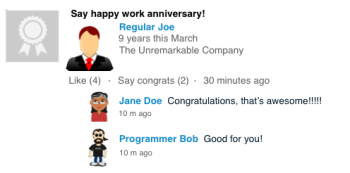Career Stagnation – Early Detection and Treatment
Have you ever been on LinkedIn and stumbled on one of their work anniversary announcements? In case you haven’t, they look something like this:

The announcements are generated by LinkedIn and typically followed by a predictable handful of likes, congratulatory words, and positive sentiments. I’m yet to see a comment that generally reflects my knee-jerk reaction to at least some of these posts.

Longevity and career stability obviously don’t have to be a bad thing, but I’ve seen far too many programmers become so comfortable in a job that they don’t bother to take a look outside to see what changes are going on outside of their bubble. When these professionals eventually decide to seek new employment, usually by way of some triggering event such as a layoff,they are usually stunned by how much the hiring landscape has changed since their last job search. This is a conversation I’ve had hundreds of times, where my role begins as educator (“JavaScript is actually pretty popular these days.”), morphs into advisor (“You might want to brush up your web skills.”), and eventually lands on crisis counselor (“It’s going to be OK.”).
Stagnation: How it happens
The formula for career stagnation is pretty simple. When one’s basic needs are met or even exceeded, they stay put. When provided with fair compensation, a tolerable work environment, and a comfortable chair, many technologists go about their work without finding the need to pay much attention to trends in the industry that don’t affect them. In an industry that changes rapidly, the result is marketability problems.
For some in our field, new challenges, learning, and change are basic needs. Even if these types are paid well and given other perks, they will be likely to investigate trends and possibly seek new employers. Their natural curiosity protects them from stagnation.
Managers hire technologists who possess the skills needed to perform jobs at their company, even if those skills are not in high demand on the overall job market. Those working for companies staying current with new tools and offering multiple challenging projects have no reason to fear the negative impact stagnation has on marketability. For those working in static environments with little change and a dependence on less popular or proprietary technologies, the burden of maintaining marketability is their own.
Avoidance, Detection, and Treatment
The biggest problem with stagnation is that technologists don’t realize it’s even an issue until it’s too late to remedy. Thankfully, there are ways to identify and treat this common problem.
- Diagnose – Set a reminder on your calendar to update your résumé and/or LinkedIn profile every six months. Are you able to add any projects or skills to your résumé? Are there any skills on your résumé that you no longer feel comfortable including for fear of being exposed as a fraud? How many six month periods have passed since you have been able to mark a significant accomplishment?
- Test – Send your résumé to a past co-worker – ideally someone who has been on the job market a bit – or a recruiter you trust, and ask if your current skills would get you interviewed. Make it clear that you aren’t actively seeking employment, but now are just interested in an assessment.
- Read and get out – Much of stagnation is related to technologists being insulated professionally and not paying attention to trends outside their offices. Reading technology blogs or article aggregators for as little as an hour per week will give you an idea if you are building marketable skills. Having any involvement with others in the industry that are not co-workers is perhaps the most valuable method of prevention. Some office environments may fall prey to groupthink and hive mind tendencies, so communication of any kind with the outside world is useful.
- If you aren’t getting it at work, get it at home – If your employer doesn’t provide you with the ability to work on challenging projects and relevant technologies, side projects are one solution if you have the time. Employers today tend to appreciate self-taught skills and impressive independent development efforts as much as on-the-job experience.
- Leave – Leaving your job doesn’t need to be the first solution to career stagnation, but for many it’s the most effective. When evaluating new employers, consider whether stagnation and marketability issues may arise again in the near future.
Marketability is a complex concept that depends upon several independent factors that are difficult to predict. Stagnation is easier to diagnose than it is to treat. Early detection is the key.

There is one more option that saved my career years ago. Talk to your manager. Let him or her know that you are interested in a new challenge. Let them know that if they see a new project to think of you. Become valuable not just in doing a good job, but in handing off technology to junior employees through great communication and documention. As Dave mentioned you need to be able to add skills to your résumé. This can’t happen if you are the only person who has your skills. Sharing knowledge makes you more valuable to the company as opposed to indispensable in a project.
That’s a great point Judy, and I’m glad you brought it up. I’d always recommend to people that they should try to make the most out of the job they have before just picking up and leaving, and requesting additional challenges can be another method to get what you want without having to deal with the potential stress of a job change.
I agree with you in principle, but I have one sticking point…
In my experience, one reason could be that someone is “stuck.” They may have taken a less than optimal job in the first place and/or been promoted a few times in their current role, but for some reason, it does not make sense to leave. In other words, say you’re doing java programming and want to move to .net, you do everything by the book (i,e. not for a lack of trying), but you can’t seem to find a suitable .net job – you aren’t called back/no job offers because you lack sufficient .net experience and/or you’d have to take a significant pay cut or you’d have to move a great distance.
That is definitely another possible reason for stagnation, and it’s quite common. I can think of many developers at a couple local companies with static technology stacks who were generally paid about 10% above market and were getting annual increases as well which put them even higher. After several years they had built up huge vacation packages amounting to perhaps 8 weeks, which adds another 10% to the mix. Most would have had to make significant lifestyle changes to leave the company, which wasn’t an option.
This is a case where people may opt to take a step back (in comp, title, etc.) in order to take two steps forward in the future. Some can’t. Usually their career reaches some kind of impasse.
Excellent article, Dave! 5 good points: Diagnose, Test, Break out of your bubble, Do it at home, Leave if necessary. All crucial to remaining marketable.
–Fred
Thanks for sharing. It can be frustrating when your mates are been promoted and you not. One need to pay attention to the tips
It’s kind of sad that the people who most need this advice have no chance of stumbling on it. If you’re not keeping your skills up-to-date, odds are you’re not trawling technical blogs either.
Agreed. Usually by the time you figure these things out, it’s too late.
If it’s too late then what to do. You are overpaid and now you do not know where to settle. Has anyone experienced this.
Lots of people have experienced this based on my conversations with engineers over the past 15+ years. In some cases, it’s worth leaving the current job for a lesser salary to “reboot” the career a bit. A small step backwards in order to gain a new marketable skill is sometimes worth a reduced salary, as long as you are thinking long-term.
I have been working in business support it team for last 10 years. Now I have reached a point where I am good at nothing. I am not a great programmer nor a great leader. I am not passionate about Tech but that’s an area where somehow I still want to stick. At this stage of career I am thinking since my data manipulation and debugging skills are good I should think about working towards building my skills in database management and afcourse I would keep working on my managerial skills. With change in technology and in world of Big data/Hadoop is there career path in related to database.
There’s always room to change your path, even after 10 years.
Very often your career is stuck because:
1. Your bosses are very happy with your performance on your current place and don’t see any reason to change anything;
2. It’s a high level of job security and good benefits (usually in public sector) that keeps you frozen on your chair;
3. Also, there is a high level of insecurity and much less benefits elsewhere (Baby, it’s cold outside);
4. Your Management’s stuck with support of retiring Legacy Systems based on obsolete software, like Adabas/Natural.